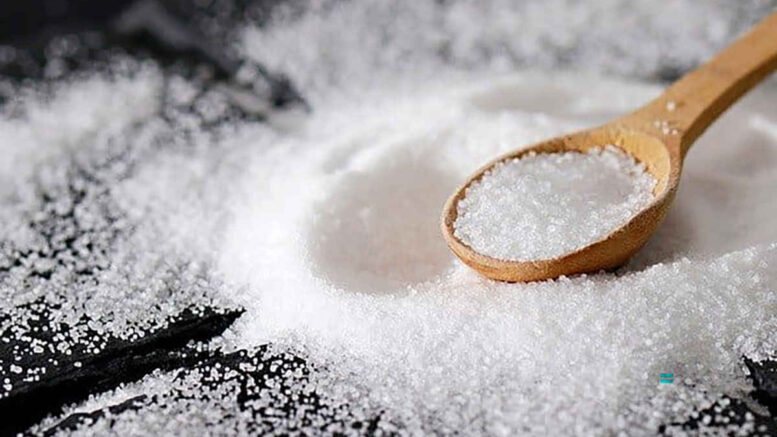Salt, It is important to understand the history of diabetes because it has had a significant impact on humanity. Diabetes raises the risk of heart disease, heart attack, and stroke by causing blood vessel damage and atherosclerosis. A diet high in salt has a similar impact. It frequently results in hypertension, a condition that worsens cardiovascular issues.
As a result, people with diabetes in particular need to watch what they eat. Salt ought to be strictly avoided. This issue has long been addressed by the World Health Organization (WHO), which advises consuming fewer than 5 g of salt daily. However, it goes beyond the things that we sell.
Let’s get ready. Don’t forget about the things we purchase. Processed foods from the store and the food served in restaurants have far too much salt. People with diabetes benefit from potassium’s assistance in keeping their bodies’ sodium levels in check. It works by reducing blood pressure. Oranges, bananas, tomatoes, and beans have the highest potassium content among fruits and vegetables.
The Skin Is a Salt Storage
The truth is that human skin is distinct. According to studies, it functions as a sort of salt reservoir. The body continuously maintains this substance’s concentration in other organs, and the kidneys help to filter away any excess. Regrettably, this results in the body producing an excess of glucocorticoids, which prevent granulocytes—the immune system’s most prevalent cells—from doing their job.
Their primary target is bacteria, as demonstrated by the cases of Listeria infections in mice, according to Dr. Jobin. – Some of them were given a diet high in salt. The researcher continues, “We counted 100 to 1,000 times more pathogens in the spleen and liver of these animals.”
Additionally, these mice fought off urinary tract infections more severely. How does this occur in people? The granulocytes extracted from the experiment participants who ingested excess salt also performed poorly against germs.
Not just salt from the shaker
What items must be excluded from a diabetic’s diet?
Aside from preventing tooth decay, avoiding simple sugars, or sweets, has various other advantages, such as lowering average blood glucose levels. Reducing your intake of simple sugars will lower your chance of organ issues. Additionally, diabetes management will be simpler.
- There is a lot of salt included in
- prepared meats,
- quick sauces,
- snacks such as chips,
- foods in cans,
- cheeses in yellow
- white bread
Thus, accepting the challenge of cutting back on salt intake entails carefully reading product labels and selecting ones with the lowest salt content.
The Immune System and Salt

A hitherto undiscovered hazard associated with excessive salt consumption was revealed by University Hospital Bonn researchers at the end of March. First, they found that mice given diets high in salt had a higher risk of developing bacterial infections. In contrast, immune system abnormalities were seen by human volunteers who consented to consume an additional 6 grams of salt daily.
The German researchers were taken aback by the finding. This is due to certain animal experiments that revealed the reverse. For instance, laboratory animals who were fed a diet high in salt did better when it came to fighting off skin-attacking parasites.
Thus, some have come to the conclusion that salt boosts immunity. We use far more table salt than our bodies require—on average, 10-15 g per day, or roughly 2-3 tablespoons of spice! Be cautious of this, particularly if you suffer from diabetes or are at risk of developing it.
Heart failure and atrial fibrillation: the sneaky job of salt It is well recognized that eating too much salt harms the cardiovascular system and increases the risk of hypertension, which in turn increases the risk of heart attack and stroke.
There might be additional risks to the cardiovascular system, though. The most prevalent type of arrhythmia, atrial fibrillation, may be more likely to occur in those who consume salt in their diet, according to research from the University of Oulu in Finland published in late 2018.
The illness can cause heart failure and increases the risk of stroke.
For an average of 19 years, the study’s authors monitored over 700 middle-aged men and women. Even after controlling for other characteristics like age, BMI, smoking, and hypertension, salt continued to raise the risk of the illness.
This study offers the first proof that eating a diet high in salt may increase the incidence of atrial fibrillation. Tero Pääkkö, the study’s principal author, notes that there is an additional cardiovascular risk connected to salt consumption. – It indicates that those with a higher risk of atrial fibrillation will benefit from cutting back on salt, but more research is required to confirm these findings, the expert continues.
On the other hand, a group from the Finnish National Institute of Health and Welfare discovered that a high salt diet dramatically raises the risk of heart failure in a 12-year research including over 4,000 participants. This finding holds true even after controlling for blood pressure, cholesterol, and body weight.
Salt and Gaining Weight
If the health considerations don’t convince someone, they might still want to take care of their appearance, particularly if they’re still a young person. Regardless of calorie intake, teens who consume large amounts of salt may gain weight more quickly.
Researchers from Georgia Regent University describe how they have observed these people to have higher amounts of leptin. It’s a hormone that, when it acts consistently, reverses the effects of reduced appetites and fat burning. Young people who enjoy salt also have greater levels of TNF alpha, a chemical that causes autoimmune disorders, and more chronic inflammation.
“Losing weight is challenging, but I think that by cutting back on salt, more people will be able to successfully lose weight,” says Dr. Haidong Zhu, the study’s author in the journal Pediatrics. Although the study did not definitively demonstrate cause-and-effect linkages, the researchers nevertheless recommend using caution when handling salt.
Obesity is a result of numerous variables, including physical activity. High intake of salt may be one of these reasons, in our opinion,” Dr. Zhu explains. The data that have been gathered thus far indicate that fat cells may become more volumetrically affected by salt.
Distribution of Energy in Meals
Meals should be consumed often, ideally at set intervals, four to six times a day. Maintaining a constant carbohydrate intake at each meal is also crucial. All of the day’s meals should include the necessary daily allowances of fruits, vegetables, meat, and dairy products.
For comprehensive information on the diet, it is recommended that you speak with a dietitian. Pregnant women, children, the elderly, and patients on insulin treatment should all do this especially. Furthermore, a dietician ought to modify each person’s diet according to their unique needs, taking into account the requirement for particular foods at particular times of the day (e.g., more carbohydrates in the first meals and a predominance of protein in the evening).
Remark
In a recent analysis, the authors assessed 13 trials with 254 persons with type 1 and type 2 diabetes that were published in The Cochrane Library. For an average of one week, they were required to drastically cut back on their usual salt intake, and the researchers looked at how much this affected their blood pressure.
They discovered that consuming less salt significantly lowered blood pressure. The salt consumption of study participants was restricted to 11.9 g for type 1 diabetes and 7.3 g for type 2 diabetes, respectively. Patients with both forms of diabetes showed a 7 mmHg reduction in systolic blood pressure and a 3 mmHg reduction in diastolic blood pressure with a daily salt reduction of 8.5 g. The researchers pointed out that blood pressure-lowering medications can provide outcomes that are comparable.
Those who have diabetes should pay particular attention to this area of their health and maintain a blood pressure of less than 130/80 mmHg. Nonetheless, the American Diabetes Association reports that 75% of adult diabetics in the US had blood pressure that was higher than recommended in 2003–2004.
Diabetics who consume excessive amounts of salt in their diet due to elevated blood pressure are at risk for stroke, heart attack, and renal damage. Supermarket and chain restaurant highly processed foods are the main sources of excessive salt consumption.
Read Also: Diabetes and Tea


Be the first to comment on "Diabetes and Salt"